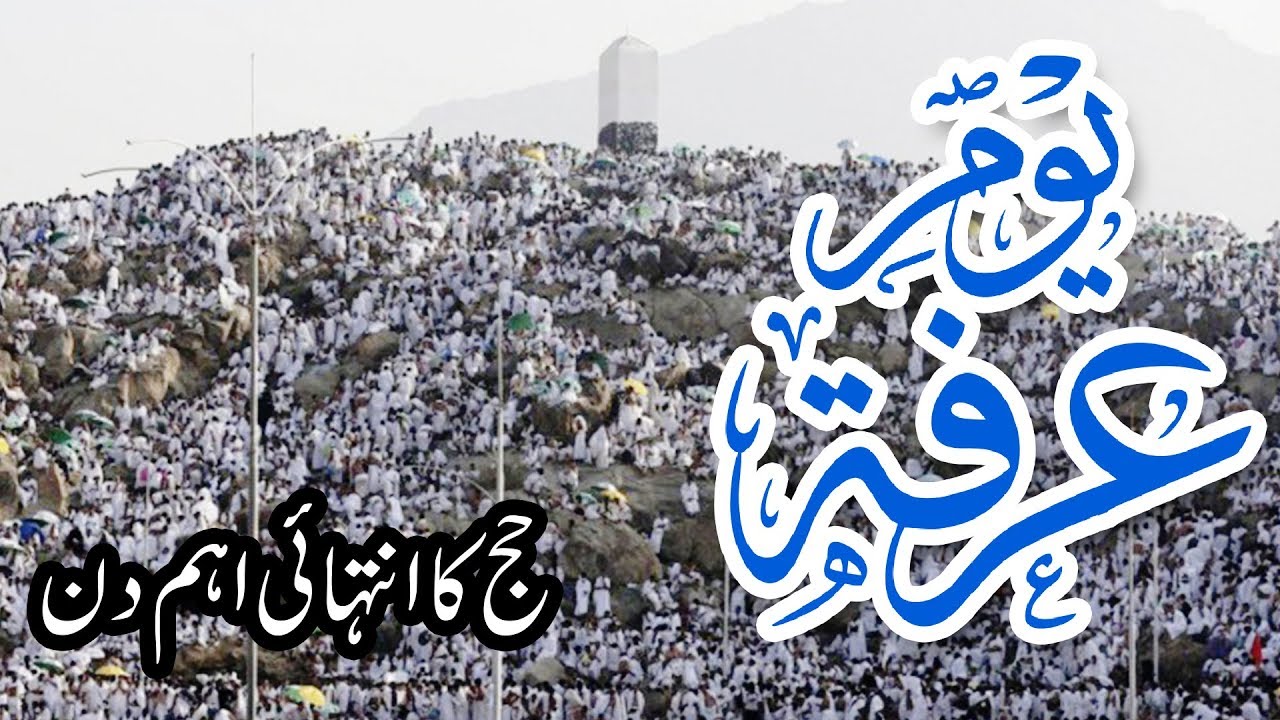In This Article We will Learn about The Day of Arafah. Another confirmed sunnah fast is the ninth day of Dhul-Ḥijjah. The Prophet used to fast on that day, and said, “Fasting the Day of ‘Arafah is expiation for [sins] of two years: the previous and the following year.” (What is meant here is minor sins and errors. It is known that major sins require sincere repentance in order to be forgiven.) (Aḥmad and Muslim) And he said, “The best of days is the day of ‘Arafah.”
However, fasting this day is for those who are not performing Ḥajj, and pilgrims should not fast while in ‘Arafah. It has been confirmed that the Prophet (Peace Be Upon Him ) did not fast the day of ‘Arafah when performing Ḥajj.
When people were speculating as to whether or not he was fasting that day, Umm al-Fadhl sent him some milk and he drank it while delivering the sermon at ‘Arafah. (Al-Bukhāri and Muslim) This was witnessed by the people and known to them.
Among the special seasons of worship are the first ten days of Dhul-Ḥijjah, which Allah has preferred over the other days of the year. ( But the last ten nights of Ramadhan are better, because they include Laylatul-Qadr, which is better than a thousand months. Although some scholars hold that the ten nights by which Allah has sworn in Surah al-Fajr refer to these ten days, the more probable view held by others is that they are the last ten nights of Ramadhan. )
These include the day of ‘Arafah and ‘Eid al-Adh∙ḥā. The Messenger of Allah said: “There are no days in which righteous deeds are more beloved to Allah than these ten days.” (Al-Bukhāri) This indicates that all kinds of worship and righteous deeds are encouraged during them. Since fasting is one of the best of deeds, many Muslims like to fast as many of these days as possible, from the first through the ninth of the month.
‘Ashūrā’, Tāsū‘ā’ and the month of Muḥarram

‘Ashūrā’ is the tenth day of Muḥarram. Fasting this day is also a confirmed sunnah but not mandatory. The Prophet ( said, “Fasting the day of ‘Ashūrā’ is expiation for sins of the past year.” ( Refer to Footnote no. 75.) (Muslim)
The Quraysh used to fast this day in the pre-Islamic period. When the Messenger of Allah migrated to Madinah he fasted ‘Ashūrā’ and told the people to fast. But then, after Allah made the fast of Ramadhān obligatory, he said, “This is the day of ‘Ashūrā’ and fasting it is not required of you. I am fasting and whoever likes may fast and whoever likes may leave it.” (Al-Bukhāri and Muslim)
After the Prophet came to Madinah, he observed the Jews fasting on the day of ‘Ashūrā’. He said, “What is this?” They said, “It is the day when Allah saved Mūsā and the Children of Israel from their enemy, so Mūsā fasted on this day.”
He said, “I am more worthy of Mūsā than you.” So he fasted that day and told [the Muslims] to fast it. (Al-Bukhāri) Later on, he heard that the Jews took the day of ‘Ashūrā’ as a festival, so to differ from them he said, “Then you [Muslims] should fast it.” (Al-Bukhāri and Muslim)
It is encouraged for one who fasts on ‘Ashūrā’ to also fast on the day preceding it, (Tāsū‘ā’, or the ninth). Upon being told that the Jews and Christians revere the day of ‘Ashūrā’, the Prophet said, “Next year, if Allah wills, we will [also] fast on the ninth.” And in another narration: “If I remain until next year, I will certainly fast on the ninth.” (Muslim) This is the sunnah.
( Although the Messenger of Allah passed away before he was able to fast the 9th the following year, the intention announced by him is sufficient to make it a lawful practice. ) However, it is permissible to fast on the tenth alone. (As for other customs such as preparing special dishes, spending money on one’s family, slaughtering an animal, doing particular acts of worship, visiting masjids and shrines, etc… all of this is innovation (bid‘ah) and has nothing to do with the Prophet’s Sunnah. Even more blameworthy are the expressions of grief in the form of weeping, wailing, beating the body and reciting eulogies on that day, although such practices were specifically prohibited by the Prophet in numerous authentic ḥadiths. In fact, the significance of ‘Ashūrā’ was established in the religion long before the regrettable martyrdom of alḤusayn, which happened to occur on the tenth of Muḥarram. 80 Sharḥ Ṣaḥeeḥ Muslim.)
In fact, the entire month of Muḥarram is a season for fasting. The Messenger of Allah said, “The best fast after Ramadhan is to fast the month of Allah which they call Muḥarram.” (Muslim) His words, “the month of Allah,” allude to its merit. The month of Muḥarram is the first month of the Islamic year and is one of the four “sacred” months. But the Prophet never fasted any month completely apart from Ramadhān. And it was reported that he used to fast more in Sha‘bān.
Much of the month of Shaʽbān
Usāmah bin Zayd reported: “The Prophet never fasted more frequently than he did in the month of Sha‘bān. When I asked why, he said, “It is a month that people neglect between the months of Rajab and Ramadhān. And it is a month wherein deeds are raised up to the Lord of the worlds, and I like to have my deeds raised up while I am fasting.” (Aḥmad and an-Nasā’i – hasan)
‘Ā’ishah added, “He used to fast until we thought that he would always fast and then he would not fast until we thought that he would never fast. But I never saw him fast in any month more than he fasted in Sha‘bān.
He used to fast all of Sha‘bān apart from a few days.” (Muslim) And she said, “I never saw the Prophet fast an entire month except for the month of Ramadhān. And I never saw him fast more often in another month than he did in Sha‘bān.” (Al-Bukhāri and Muslim)
There is no authentic (ṣaḥeeḥ) or acceptable (ḥasan) narration concerning the eve or the day of the fifteenth of Sha‘bān.Every ḥadith mentioning it is either weak or fabricated, and thus unacceptable.
There is nothing exceptional about this night, and no particular worship is prescribed for it. And it is not permissible to single out the day of the fifteenth for fasting. It is well to fast it along with other days of the month provided that no particular merit is attributed to this day.
Three days from each month
Fasting three days out of each lunar month was obligatory before Allah decreed the fast of Ramadhān in the second year following the Hijrah. The Messenger (Peace Be Upon Him ) had ordered Muslims to fast the “white” days (ayyām al-beedh), which are the days in mid-month when the moon is full, the 13th, 14th and 15th, and added that it was equal to fasting for all time.
( The reward for each good deed (day of fasting) is multiplied by ten, so 3 days x 12 months x 10 = 360, or a complete year. And Allah confirmed it in the Qur’an: Whoever comes [the Day of Judgement] with a good deed will have ten times the like thereof. (Sūrah al-Anʽām, 6:160)
[1] There are narrations which mention the beginning of the month, so it may be concluded that one may fast other days in place of the “white” days when necessary.) (An-Nasā’iḥasan) He continued to fast these days voluntarily after Ramadhān became obligatory, whether he was at home or on a journey.
Ibn Mas‘ūd reported that Allah’s Messenger would fast the prime three days each month and would seldom break his fast [if one of them occurred] on Friday. (There are narrations which mention the beginning of the month, so it may be concluded that one may fast other days in place of the “white” days when necessary.) (At-Tirmidhi – ḥasan) And he said, “If you want to fast, then fast the “white” days.” (An-Nasā’i – ṣaḥeeḥ)
Mondays and Thursdays
The Prophet ( ) was also in the habit of fasting Mondays and Thursdays of each week. (Ibn Mājah – ṣaḥeeḥ) When asked why, he replied, “Deeds are raised up [to Allah] on Monday and Thursday and I like my deeds to be raised up while I am fasting.” (Al-Bayhaqi – ṣaḥeeḥ)
Another narration states: “The gates of Paradise are opened on Mondays and Thursdays and every servant who does not associate anything with Allah is forgiven, except for a man between whom and his brother is enmity; it is said, ‘Keep these two back until they reconcile.’” (Muslim)
Regarding Monday, he said, “It is the day on which I was born and on which [the revelation] was sent down to me.” (Muslim) Another ḥadith mentions that the Messenger of Allah used to do his best to fast on Mondays and Thursdays. (At-Tirmidhi and an-Nasā’i – ṣaḥeeḥ)
Alternate days
Allah prefers consistency in worship rather than excess. (According to the ḥadith narrated by al-Bukhāri and Muslim, the Prophet (said, “The most beloved deeds to Allah are those that continue, even if they are few.”
![Write a detail note about The day of ‘Arafah ? mentioning sentence in English, Sahih al bukhari in urdu, reward system for kids, and quranmualim Learn Quran, Quran translation, Quran mp3,quran explorer, Quran download, Quran translation in Urdu English to Arabic, almualim, quranmualim, Islam pictures, Islam symbol, Shia Islam, Sunni Islam, Islam facts],Islam beliefs and practices Islam religion history, Islam guide, prophet Muhammad quotes, prophet Muhammad biography, Prophet Muhammad family tree.](https://www.quranmualim.com/wp-content/uploads/2019/05/Write-a-detail-note-about-The-day-of-‘Arafah-C.jpg)
Recommended For You
- How To Prepare For Ramadan?
- Can Vomiting Break Your Fast?
- Physical Benefits of Fast in Ramadan
- Which Are The Fasting Days In Islam?
- Can You Hug Your Wife While Fasting?
- What Breaks Your Fast? | Islamic Laws
- Write A Detail of Break The Fast At Sunset?
- Can We Miss The Fast? | Fidya And Kaffarah
- Can You Have Intercourse During Ramadan?
- Explain Intercourse During The Day in Ramadan
- Write A Detail About Introduction Fasting in Islam
- Write A Detail About The Fasting During Ramadan?
- What Are The Conditions For The Validity of The Fast?
- Write About Recommendations For The Fasting Person?







